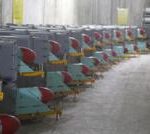In September, Nigeria’s agricultural sector faced severe challenges as devastating floods swept through vulnerable communities, exacerbating food insecurity concerns in farming areas.
Flooding in Anambra and Borno states forced anxious farmers to harvest crops prematurely, raising alarms about food availability. Paul Odenigbo, Executive Secretary of the Anambra State Emergency Management Agency, reported that many farmers were compelled to act quickly to avoid impending disasters. He noted that rising water levels have already submerged significant portions of farmland.
“The water level has been on the increase and is expected to rise more due to activities from neighboring countries,” Odenigbo stated. He urged those in riverine areas to seek higher ground in anticipation of worsening conditions.
In Borno, the National Commission for Refugees, Migrants, and Internally Displaced Persons (NCFRMI) warned that flooding in Maiduguri could further escalate food insecurity. Tijani Ahmed, the federal commissioner, indicated that approximately 40 percent of farmland in Maiduguri had been inundated before the harvest season, jeopardizing crops and affecting over a million people already facing food shortages.
Meanwhile, the Nigerian poultry industry continues to struggle with poor egg quality due to inadequate feed storage.













